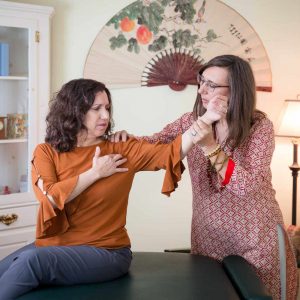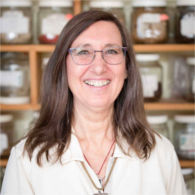Here’s a study published a few years ago by a Stanford researcher showing the benefits of acupuncture for hot flashes. The study followed patients for seven weeks of treatment. In Chinese Medicine we treat in courses: a clinical course of treatment being 10-12 visits or weeks of herbal medicine. I have found in clinic that the first course of treatment tends to be 10-15 visits. In that amount of time I can usually get mild or acute symptoms resolved, and more chronic symptoms reduced and under control. Inexplicably this study tracked patients for only 7 visits. I’m sure the results would have dramatically increased had the patients continued treatment for a full course, or longer.
I have noticed that studies usually show a lower percentage effectiveness than what I and others in the field see in clinic. I’ve discussed this paradox with colleagues, and our explanation is that in studies the researchers choose one simple protocol and give it to everyone in the study, often not a protocol actually used in clinic. One of the hallmarks of Chinese medicine is individualized treatments. So although 10 women may all come in for hot flashes, they would get different treatments based on their constitutional differences in clinical presentation.
That being said, I do have a simple point combination that I have found generally effective for most all women with hot flashes. However, I potentiate the treatment by adding additional points to treat the constitutional individualities.
I don’t like to quote percentages of effectiveness of my treatments, because I’ve noticed phenomenally that as soon as I do, someone comes in who is a non-responder. But I will say, based on my clinical experience that hot flashes is a condition I expect to respond well and eradicate with Chinese medical treatment that includes a combination of acupuncture and individualized Chinese herbal formulas. KB
Acupuncture reduces nighttime hot flashes caused by menopause, according to a study published in the journal, Fertility and Sterility.
Researchers found that seven weeks of acupuncture treatment reduced the severity of nighttime hot flashes by twenty-eight percent among menopausal women compared with a six percent decrease among women who had a sham acupuncture treatment.
The effects of acupuncture vs. a sham acupuncture treatment on the severity and frequency of nighttime hot flashes were compared. Taking part in the study were twenty-nine menopausal women experiencing at least seven moderate to severe hot flashes per day.
All of the women underwent nine treatments from trained acupuncturists in sessions over seven weeks. Twelve of the women received real acupuncture using points selected to target hot flashes and sleepiness. The rest of the women received a sham acupuncture treatment using non-penetrating needles at random acupuncture channel points.
Throughout the study, the women reported the number and severity of their hot flashes. The results showed that nighttime hot flash severity decreased significantly (twenty-eight percent) among the women who received acupuncture vs. a six percent drop among the women who got the sham treatment. However, they did not see a similar finding in the frequency of nighttime hot flashes between the two groups.
Researcher Mary Huang, M.S., of Stanford University, and colleagues say the results suggest acupuncture deserves further study as an alternative treatment for menopausal hot flashes.
Source:
Huang, M. Fertility and Sterility, September 2006; Vol. 86: pp. 700-710. News release, American Society of Reproductive Medicine.









